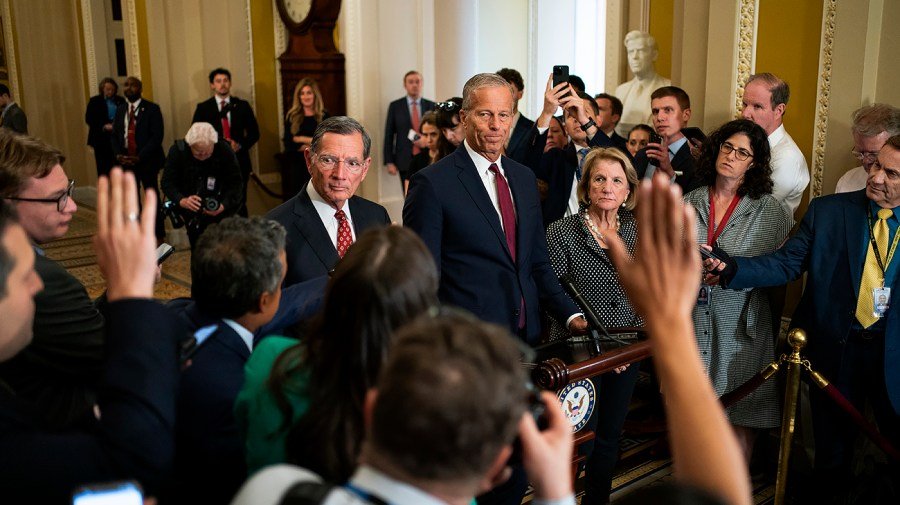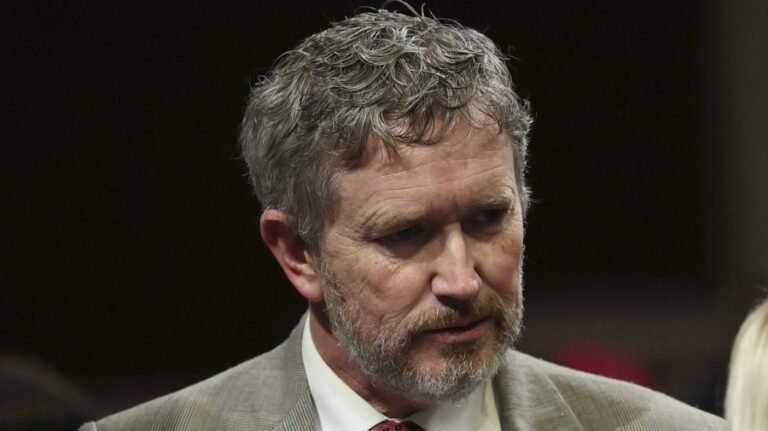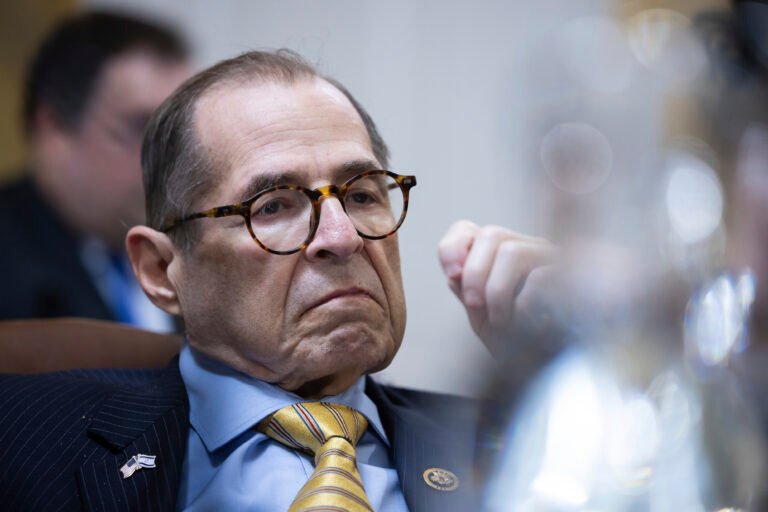
Related video: Jeffries, Schumer Call For ‘FOUR CORNERS’ Meeting with GOP Leaders To AVOID Shutdown | SUNRISE
Senate GOP leaders are staring down a lengthy to-do list of priorities that will force them into a delicate balancing act, including funding the government and changing the rules to expeditiously confirm President Trump’s nominees.
The upper chamber reconvenes on Tuesday following the month-long August break and is set to hit the ground running with only weeks between their return and a potential government shutdown.
But amid bipartisan priorities including government funding and getting the National Defense Authorization Act (NDAA) ready for prime time, Senate Majority Leader John Thune (R-S.D.) will also be forced to juggle a series of thorny political items. Those are headlined by the GOP’s effort to change the rules to confirm more of President Trump’s nominees, chaos at the Centers for Disease Control and Prevention and the White House decision to issue a “pocket rescission,” which tossed a major wrench into the funding wars of the coming weeks.
“He’s going to have a full plate,” one Senate Republican told The Hill.
Democratic leaders on Thursday called on Thune and Speaker Mike Johnson (R-La.) to hold a “four corners” meeting immediately when Congress returns, which will be exactly four weeks before the funding deadline.
Republicans in March were able to back Democrats into a corner to pass a government funding package for the remainder of the fiscal year, but the minority party has vowed that there will be no repeat this time around.
“The Sept. 30th funding deadline will be upon us shortly. It is therefore imperative that we immediately meet upon our return to Congress next week to discuss the need to avert a painful, unnecessary lapse in government funding and to address the healthcare crisis Republicans have triggered in America,” Senate Minority Leader Chuck Schumer (D-N.Y.) and House Minority Leader Hakeem Jeffries (D-N.Y.) wrote.
But any hopes for progress took a major hit late last week when the White House announced an attempt to claw back $4.9 billion in foreign aid funds without congressional approval, drawing the ire of Democrats and appropriators and increasing the chances of a shutdown.
Such a move had not been made in nearly a half-century, and it is expected to face legal challenges. It also comes two months after GOP lawmakers approved the first rescissions package worth $9 billion that targeted global aid programs and the Corporation for Public Broadcasting.
“I was feeling good about where we were [on a spending deal]. I don’t feel good after this morning,” one Senate GOP aide told The Hill shortly after the rescissions package was revealed.
Schumer wasted little time lambasting the move, arguing that Trump and GOP lawmakers don’t have “any plan to avoid a painful and entirely unnecessary shutdown.” He added that Thune and Johnson have “repeatedly refused” to meet with Democrats to discuss a “bipartisan path forward.”
“In fact, it seems Republicans are eager to inflict further pain on the American people, raising their health care costs, compromising essential services and further damaging our national security,” the Democratic leader said. “[I]f Republicans are insistent on going it alone, Democrats won’t be party to their destruction.”
Both sides are expecting to pass a stopgap spending bill in order to keep the government’s lights on as both chambers still have a ways to go before wrapping up work on a full-year funding package.
Senators passed only three of the 12 annual appropriations bills so far in one of their final actions before recess. The House has passed two. And the chambers’ bills differ sharply.
Senate Appropriations Committee Chair Susan Collins (R-Maine) also made her opposition clear to the rescissions play, saying in a statement that the action is “unlawful” while underscoring the worries about a shutdown in the process.
“Any effort to rescind appropriated funds without congressional approval is a clear violation of the law. “Instead of this attempt to undermine the law, the appropriate way is to identify ways to reduce excessive spending through the bipartisan, annual appropriations process,” Collins said. “Congress approves rescissions regularly as part of this process. In fact, the year-long funding bill that we are currently operating under includes 70 rescissions. … The annual funding bill is the most appropriate way to ensure that any rescissions reflect the views of Congress.”
Further complicating the spending effort is the calendar. All of Congress will be in recess the final full week of September in observance of the start of the Jewish high holidays, nixing a key stretch for work on Capitol Hill days before the Sept. 30 deadline.
Alongside the funding battle, the immediate concern for the Senate GOP is processing scores of Trump nominees to fill out various departments and agencies, with a change in the chamber’s rules likely on deck for them to do so.
Republicans were angry when they departed for the August break without a bipartisan deal to greenlight potentially dozens of nominees in bloc, with Thune and rank-and-file members being quick to mention that none of his choices have been advanced via a voice vote or unanimous consent. Only one of Trump’s nominees — Secretary of State Marco Rubio — did not face a full filibuster.
This has led GOP members to beat the drums louder for a possible rules change that would allow them to expedite the passage of nominees, including lowering the debate time for lower-level selections down from two hours to 15 minutes or eliminating the cloture vote in whole, among other things.
“We’re trying to figure this out. The last 20 years, it’s getting worse every session,” Sen. James Lankford (R-Okla) recently told reporters at the Capitol.
Lankford and Sen. Katie Britt (R-Ala.) are leading a working group of a half-dozen members to “explore the menu of options,” be it an internal quick fix or something more long-term that Democrats could potentially get behind.
“It’s intolerable,” Lankford said. “Whether you’re a Republican [or] Democrat president, we’ve got to figure out how the president actually gets confirmed nominees.”
In positive news, the process to pass the NDAA remains on track, with both chambers set to vote on it in the coming weeks and a conference process expected to commence in the ensuing weeks.
There are other items that aren’t likely to be priorities, but very much could be on the docket at some point during their first month back.
Republicans have waited on a green light from Trump to put a bipartisan Russia sanctions package on the floor, but pressure could heighten after Moscow fired a series of missiles at Kyiv on Thursday, with Russian President Vladimir Putin showing few signs of being ready to end the war.
“India, China, Brazil and others who prop up Putin’s war machine by buying cheap Russian oil: How do you feel right now that your purchases have resulted in innocent civilians, including children, being killed?” Sen. Lindsey Graham (R-S.C.), a lead sponsor of the proposal, posted on X after the attacks on Kyiv.
The package would levy a 500 percent tariff on imports on those countries for their continued purchase of Russian uranium, gas and oil.
Emily Brooks contributed.


